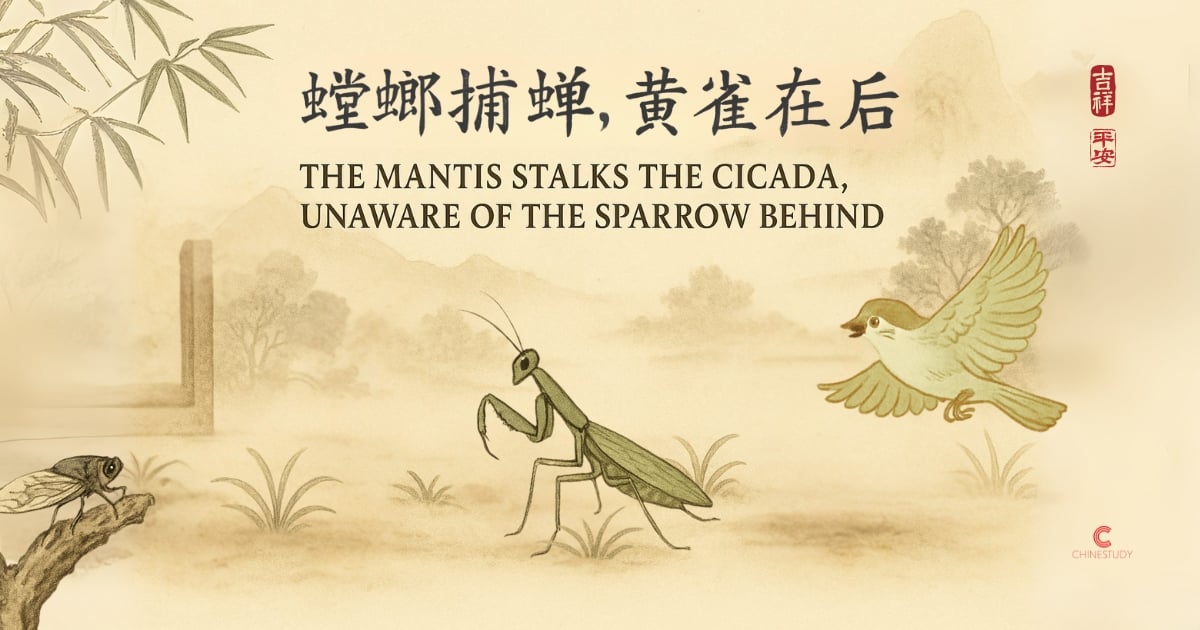🪲 螳螂捕蝉,黄雀在后 táng láng bǔ chán, huáng què zài hòu – Focused on Gain, Blind to Danger

🔍 What It Means
螳螂捕蝉 (táng láng bǔ chán), 黄雀在后 (huáng què zài hòu) literally means “the mantis catches the cicada, but the oriole is behind.”
Word-for-word:
- 螳螂 (táng láng) – mantis
- 捕 (bǔ) – to catch
- 蝉 (chán) – cicada
- 黄雀 (huáng què) – oriole (a bird)
- 在后 (zài hòu) – behind
It describes someone so focused on an immediate gain that they don’t notice a bigger danger coming from behind.
In English, it’s like saying:
- 👀 “Blinded by greed”
- 🎯 “Only seeing the prize, not the risk”
- 🪤 “Like a trap behind the bait”
🏺 Where It Comes From
In ancient China, a story tells of a mantis spotting a cicada.
Hungry, the mantis crept forward — ready to grab the cicada.
But behind the mantis, a yellow oriole bird silently watched — planning to catch the mantis!
The mantis only saw the cicada.
It didn’t know it was being hunted too.
This gave birth to the idiom:
- 螳螂捕蝉,黄雀在后
(táng láng bǔ chán, huáng què zài hòu)
Focused on gain, blind to danger
💬 How to Use It
Use 螳螂捕蝉,黄雀在后 when someone is so focused on getting something that they don’t notice the bigger threat.
- ❌ Negative tone – warning about shortsightedness
- ✅ Often used in politics, business, personal caution stories
🎯 Real Examples
1. 他忙着抢客户,没注意到自己的公司被收购了,真是螳螂捕蝉,黄雀在后。
- Tā máng zhe qiǎng kèhù, méi zhùyì dào zìjǐ de gōngsī bèi shōugòu le, zhēn shì táng láng bǔ chán, huáng què zài hòu.
- 👉 He focused on stealing clients, but didn’t see his own company being bought out — truly like the mantis and the oriole.
2. 政客互相攻击,却没看到另一个政党已经准备夺权,螳螂捕蝉,黄雀在后。
- Zhèngkè hùxiāng gōngjī, què méi kàn dào lìng yí ge zhèngdǎng yǐjīng zhǔnbèi duóquán, táng láng bǔ chán, huáng què zài hòu.
- 👉 Politicians attack each other, but miss the rival party preparing to take power — mantis, cicada, and oriole again!
⚠️ Common Mistakes (Watch Out!)
- ❌ Mistake: Using it just to mean “someone failed”
- ✅ Correct: It must involve someone gaining something while unaware of bigger danger behind them
💡 Memory Tip

Imagine a mantis slowly approaching a cicada.
Just as it’s about to grab the cicada… a bird swoops in from behind and grabs the mantis!
That’s 螳螂捕蝉,黄雀在后 — being so close to a win but missing the real threat.
🧩 Interactive Practice
Translate this sentence into English:
- 那个商人太专注打折活动,没发现竞争对手在暗中开新店,螳螂捕蝉,黄雀在后!
Answer:
The businessman focused too much on the discount event, and didn’t see the competitor secretly opening new stores — mantis catches cicada, oriole behind!
🌟 Final Thoughts
In life, it’s easy to focus only on short-term success.
But true wisdom is looking behind the target — and spotting the hidden risks.
👉 Ask yourself: Am I seeing just the cicada… or also the oriole?
👉 Stay tuned for the next idiom in this series!
Thank you for subscribing!
Have a great day!